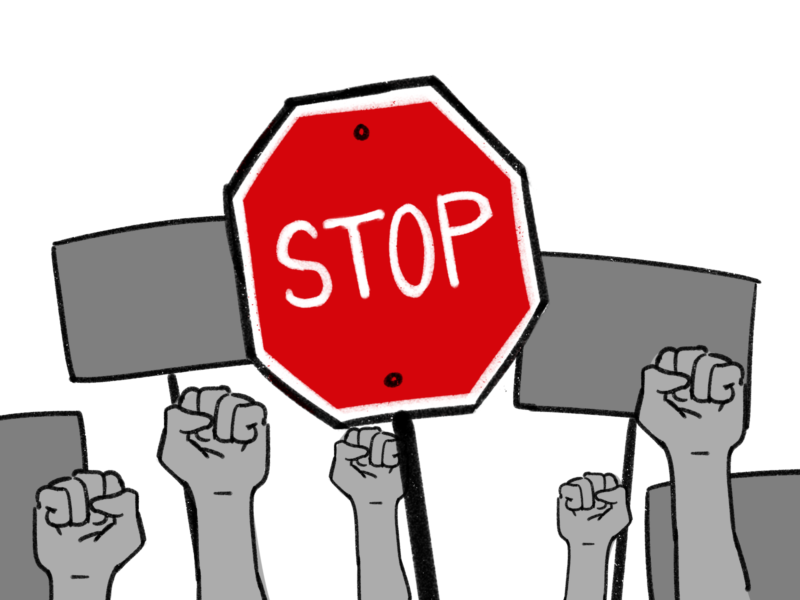Irish student activists have long championed issues happening on other shores, from condemning apartheid in South Africa to voicing their support for Palestine. But there are major problems on our own continent that have been largely overlooked here.
There has been a lot of news about eastern Europe lately, and it has rarely been good. In Belarus, dissenting journalists have been detained, and political opponents have died in prison. Ukraine saw a buildup of Russian troops on its border. Irish and English footballers were booed and jeered by Hungarian, Austrian, and Romanian fans for taking the knee, a symbolic gesture to condemn racism. Hungary’s ruling Fidesz party left the European People’s Party earlier this year due to threats of expulsion over its increasingly authoritarian, far-right policies. They and their Polish allies, the Law and Justice Party, have attacked abortion rights, academic freedom (including repressing publications about Poles’ complicity in the Holocaust), LGBTQ+ rights, and democracy generally. Russia remains authoritarian and imperialist.
Considering these threats, and our growing connections, it is time for us to end the comparative indifference of Irish students to the region. However, I think helping will be harder than we might imagine, and will require respect and sensitivity here too.
Irish students, many of whom care deeply about human rights, appear apathetic to Eastern Europe compared to our interest in American prisons, the Israel-Palestine conflict or Boris Johnson’s wedding. I’m not guiltless on this point and recently I’ve felt aware of my comparative ignorance of eastern Europe and lack of engagement with it. We cannot be experts in everything: it is unrealistic and unhealthy to attempt to carry the whole world on your shoulders. But it is worth paying more attention to Eastern Europe than we do.
I think helping will be harder than we might imagine, and will require respect and sensitivity here too
Firstly, problems in eastern Europe are dangerous to people in the West: see the meddling in the US elections or the cyberattack on the HSE. Secondly, but no less importantly, we are connected to some of these countries at a different level: they are our fellow EU citizens. Besides free travel, we share a parliament, giving us a more direct say in laws and policies that affect each other. Somebody from Ireland not knowing what’s going on in Hungary is not like someone from Delaware not knowing what’s going on in Hungary. It’s like someone from Delaware not knowing what’s going on in Texas.
However, if we are to do something about these issues suffered and perpetrated by our fellow citizens, we will not get far by slapping a system of ideas built to explain the USA and western European empires onto them. The Hungarian fans’ jeering is reprehensible, but it is too easy to feel smug that Irish footballers are more enlightened than they are. Prejudice and oppression are not new to Eastern Europe. One-way lectures from us on racism and empire to countries that have suffered centuries of Russian, German, Austrian and/or Ottoman imperialism – with accompanying ethnic and religious hierarchies – would be condescending, especially as Western attitudes to Slavs have also sometimes been racist.
To satisfy oneself by repeating the mantra that all our problems will disappear if only we tear down capitalism (regardless of whether those problems predate capitalism) to countries where atrocities were committed in the name of anticapitalism within living memory would be insensitive (the 1933 Ukrainian famine, deliberately orchestrated to punish farmers for resisting collectivisation, killed a similar portion of the population to Ireland’s Great Famine). This is not to say Eastern Europe can learn nothing from the West – everybody can learn something from anybody if they put their mind to it – but that learning cannot be one-way.
Possibly the most horrific episode of racist violence in history, the German and Austrian-driven Holocaust and Sinti and Roma genocide, happened primarily in Eastern Europe not so long ago, yet now we see a revival of far-right rhetoric there, and a repression of attempts to confront that past. This is an example of both the need to support democracy and an honest engagement with history in the region, and a reminder of the importance of Eastern Europe to an understanding of world history. While condemning the far right in the region, we too should try harder to remember experiences often left out from our worldviews. Eastern Europe’s history and identities complicate the more complacent and dogmatic narratives that many of us here in Trinity have come to accept as a suitable explanation and solution for everything: unsurprising considering those narratives were likely not conceived with Eastern Europe in mind.
We are connected to some of these countries at a different level: they are our fellow EU citizens
We all lose out from this detachment. There is a great deal of knowledge and culture, and also of suffering, in Eastern Europe that Westerners (myself included) have too long overlooked. It is time to take more notice of things that happened not so far away, not so long ago. Any global or EU discussion of political injustice that does not include Eastern European history and perspectives is woefully incomplete. There are problems we must condemn, yet we must also bring Eastern European voices in from the periphery, acknowledge their experiences, and respect them as fellow citizens.







